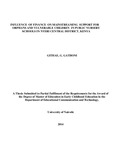| dc.description.abstract | Orphaned and Vulnerable Children (OVC) below 8 years represent an extremely vulnerable
population due to growing levels of poverty, HIV/AIDS and socio-economic situation in
which they find themselves in. For this reason Public Nursery Schools (PNS) are receiving
greater attention as places to remedy the decline of family and community based support for
OVC as schools provide appropriate channels through which essential services such as food,
healthcare, clothing, education and psychosocial support are provided. Though the goal of
expanding Early Childhood Education (ECE) opportunity for all children is integrated into a
number of global initiatives such as Education for All (EFA) and Millennium Development
Goals (MDG), PNS face the burden of fewer resources as the support systems for OVC such
as school feeding, health and nutritional care and psychosocial support are extremely linked
to Education Finance. Steady provision of funding at government as well as family and
community level ensures that PNS improve the wellbeing and learning outcomes through
whole school interventions for OVC. By contrast, deprivation of interventions during the
early years results in lifelong deficiencies and disadvantages. The purpose of this study was
to find out the influence of finance on mainstreaming support for OVC in PNS in Nyeri
Central district in relation to how the different types of financing mechanisms, availability,
adequacy and allocation of funds influences mainstreaming support for OVC in Nyeri Central
district. Nyeri Central district has a total of 36,190 poor households with 4,261 households
with more than two OVC. The study employed a descriptive survey design with a sample of
19 public nursery schools stratified into 9 schools in the Northern zone and 10 in the
Southern zone. Data was collected through questionnaires for head teachers and a nursery
school teacher for each school. An interview was conducted with the District Centre for Early
Childhood Education (DICECE) programme officer of the district under study. Data was
analyzed using both qualitative and quantative techniques and presented in form of frequency
distribution tables, bar graphs and narrative. The study found out that the main source of
funding for the PNS came from parents and well wishers. There being no reliable funding for
OVC, mainstreaming support for OVC was compromised as source of funds were inadequate
for OVC support, capacity building for teachers and retention of OVC in schools through
subsidized fees and bursary funds. OVC support was hidden in other programmatic areas
resulting in very little funds being allocated to support systems for OVC. To avert this crisis,
the study recommends that the government should intensify support for OVC through
increased budgetary allocation and setting up funds earmarked for OVC in PNS. In addition
to this, management of PNS should look for alternative sources of funds to secure more and
reliable funding for OVC support. | en_US |

